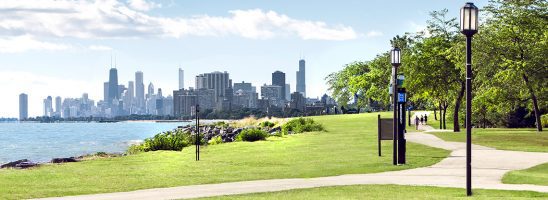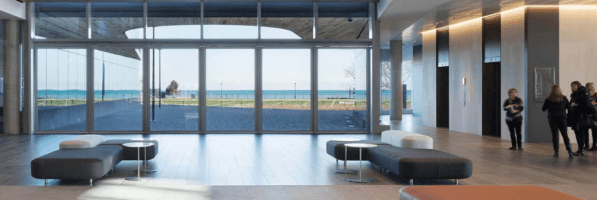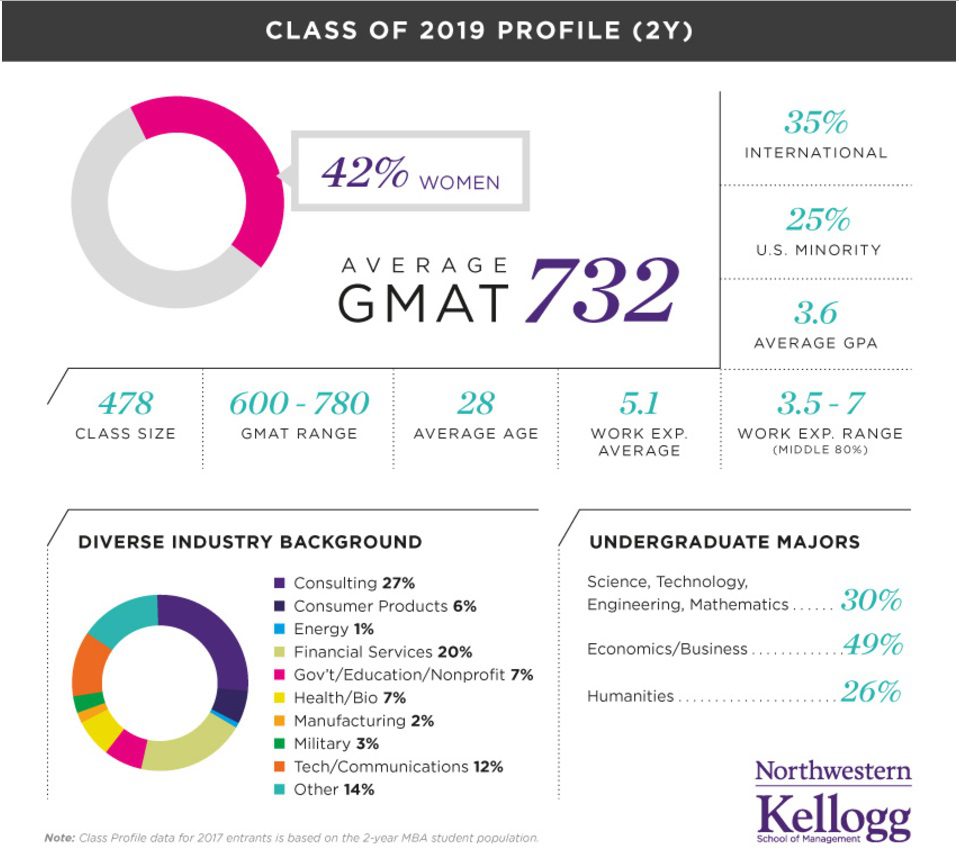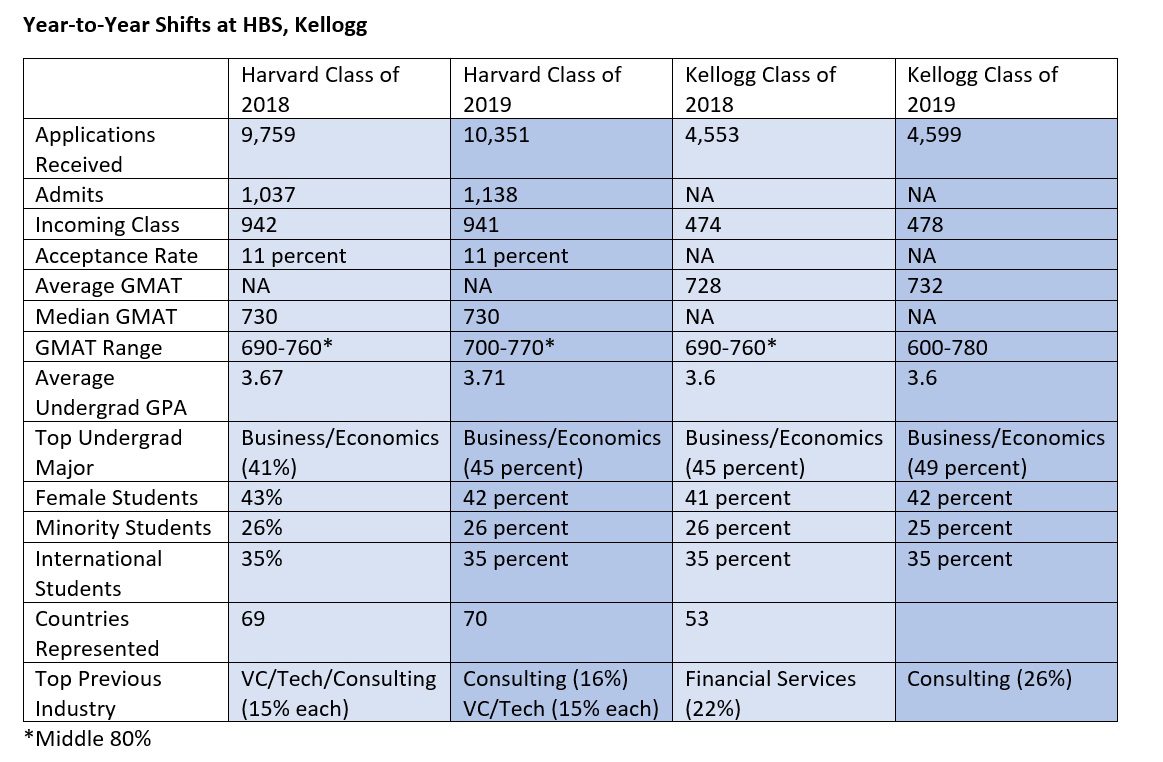Northwestern Kellogg MBA Class of 2020: 46 Percent Women, 27 Percent U.S. Minorities

Northwestern University’s Kellogg School of Management announced today that women will make up 46 percent of the incoming two-year, full-time MBA Class of 2020. That’s a four-percentage point jump over last year and a record high for the school. U.S. minorities are also up—comprising 27 percent of this year’s first-year students, as compared to 25 percent last year. Meanwhile, average GMAT (732) and GPA (3.6) were identical to last year. Class size also remained constant at 478.
“I am very, very thrilled with the diversity of the class,” Melissa Rapp, Kellogg Director of Admissions for full-time MBA and MSMS programs, told Clear Admit. “And not just because of the percentages but also the quality of candidates across the board,” she said. International students will make up 34 percent of the incoming class, drawn from 46 countries around the globe, a modest one-percentage point decline amid soft overall international applicant volume to U.S. schools.
Rapp pledged that she and her team will keep striving to attract the most diverse classes possible. “I firmly believe that diversity in the classroom leads to better learning and a more impactful experience for every student who is here,” she said.

Steady State Elsewhere Is Great
For the past six years Kellogg’s average GMAT score has been on the rise, climbing from 708 in 2012 to 732 last year. Rapp said she is not at all concerned to have it remain static at 732 this year. “That our average GMAT and GPA have stayed the same shows that we continue to attract a really outstanding pool of applicants year after year,” she said.
Average undergraduate GPA also didn’t budge—coming in at 3.6 for now the third year running. As for what applicants studied while in college, 50 percent of this year’s incoming class majored in business or economics, up from 49 percent last year and 45 percent the year before that. STEM majors fell slightly to 29 percent, down from 30 percent the year before. Humanities majors both this year and last made up the remaining 26 percent.
Varied Professional Experience
In terms of pre-MBA work experience, approximately one in four incoming Kellogg students—24 percent—come from consulting, down from 27 percent last year. Another 19 percent come from the financial services industry, also a slight decrease from last year’s 20 percent.
Up this year? Students who have worked in tech/communications grew from 12 to 13 percent. “I think the changes that we see in our class really reflect the changes that we see in the business world,” Rapp said. “There are more people from tech, which is not surprising for anyone since there is more tech in the world than there ever has been.” Students with government/education/nonprofit experience also increased, from 7 to 9 percent.
Overall Rapp is pleased to see Kellogg continuing to attract a wide range of students from across functions and industries. “The variety continues to be very strong both in terms of our incoming students and our outgoing graduates,” she added. “Again, those differences and that diversity is what makes the Kellogg experience so strong.”
Kellogg’s Efforts to Support Women May Off
By far the biggest news today is that Kellogg has come closer than ever before to gender parity with its newest incoming class. USC Marshall School of Business made headlines last month by becoming the first leading business school to cross the 50/50 mark—women will make up 52 percent of the Marshall Class of 2020, a staggering 20-percentage-point jump over last year. At UT Austin’s McCombs School, which has also shared a preliminary Class of 2020 profile, the percentage of women slipped year over year, from 40 to 38 percent. And at Cornell’s Johnson Graduate School of Management, which welcomed it new Class of 2020 students to campus last week, women make up 33 percent, a five-point gain over last year.
“It’s really pretty exciting,” said Rapp of Kellogg’s 46 percent women. She credits the gains in female enrollment in part to the vision and leadership of outgoing Kellogg Dean Sally Blount, who served as dean from 2010 until she stepped this past spring.
Kellogg has also called on its current female students, including members of the Kellogg’s student-led Women’s Business Association (WBA), to take part in admissions outreach activities in hopes that they can forge meaningful connections with prospective female candidates early in their exploration process.

Melissa Rapp, Kellogg Director of Admissions for the full-time MBA and MSMS programs.
New this year, the school also convened its inaugural Global Women’s Summit in May. More than 1,200 women participated “live”—with 800 at Kellogg’s Global Hub in Evanston and the rest via extension events in London, Hong Kong, New York, Boston, San Francisco, Miami, Seattle, and Chicago hosted by companies including Amazon, Microsoft, and Starbucks. Over the course of the two-day event, the #KelloggWomen hashtag was trending in Chicago and generated 2.7 million overall impressions. “The breadth of engagement the summit allowed for provided a really nice bridge from prospectives to current students to our alumnae population,” Rapp said.
Kellogg also this year hosted its third-annual Women’s Leadership Seminar, a unique five-week lineup for second-year MBA students combining lectures, workshops, networking events, and alumni panels on recruiting issues women face. “The goal is to ensure that our high-potential women are equipped to pursue and navigate careers that have deep personal and professional meaning,” Rapp said.
“This combination of everything from lunch and learns to seminars to summits really helps the women here know that Kellogg understands the unique situation they are in and the challenges they will face on their journey to become impactful leaders and is proactively talking about that and helping them navigate that.”
Those Kellogg women, it seems, have been doing a good job of helping prospective female applicants see Kellogg as a place they want to be, too.
This article has been edited and republished with permissions from our sister site, Clear Admit.
Kellogg Launches ‘Ask an Admissions Officer’ Initiative on Social Media

Are you curious about the Northwestern University Kellogg admissions process? Do you want to know if it’s better to apply in one round or another, what the committee is looking for, or how you can apply to more than one program at a time? Kellogg’s new social media initiative, “Ask an Admissions Officer,” offers answers to these burning questions and more.
“Simply put, we are giving people an opportunity to send us questions via Instagram direct message (DM),” explains Kellogg Communication Specialist Rebecca Rogalski.
“Then, our social team is going to collect the best and most frequently asked questions, creating a short series of videos with the Kellogg admissions officers answering those questions.”
Kellogg applicants who want to submit their questions over the next week should do the following:
- Follow @KelloggSchool on Instagram.
- Send the school a question via direct message.
- Check back in early August to see if your question was answered.

This is an ideal opportunity for Kellogg hopefuls to get answers to all their burning questions before the Round 1 deadline on September 19, 2018.
Pro tip: Before you submit your question to Instagram, make sure it doesn’t have an answer that can be easily found on the Kellogg website. We suggest checking the Admission Facts & Tips section first if you need intel on …
- The best time to apply
- Deferrals
- Applying with a partner
- Work experience recommendations
You can also check out last year’s Clear Admit post where Kellogg’s Director of Admissions for the full-time MBA and MSMS Programs Melissa Rapp discussed application essays, female enrollment, and more.
Remember to stay tuned later this month for the Kellogg admissions team to provide video answers to the most frequently asked questions.
This article has been edited and republished with permissions from our sister site, Clear Admit.
Kellogg Admissions Director Shares Insights on 2019 MBA Application

Northwestern University’s Kellogg School of Management is one of several leading business schools to release its 2019-2020 MBA application online within the last week. At Kellogg, deadlines for the upcoming admission season are as follow:
- September 19, 2018
- January 9, 2019
- April 10, 2019
To help you get started, Director of Admissions Melissa Rapp provided insight into the 2019 MBA application along with some great advice on how to prepare. We’ve shared some of the most pertinent details below.
Written Essay Questions Remain Unchanged
The Kellogg written essay questions remain the same this year as last. Applicants will need to answer the following two questions.

- Tell us about a time you have demonstrated leadership and created lasting value.
To answer this question, MBA applicants should think about a specific challenge they have faced in their career and how they overcame it. Specifically, Rapp advises applicants to think about their contribution to their organization and the lasting value they created.
- How have you grown in the past? How do you intend to grow at Kellogg?
This question is about looking at both past performance and future behavior. Remember to keep in mind the reason why you’re pursuing an MBA in your answer.
Video Essay Advice
For four years, MBA applicants have been expected to complete a video essay, and this interview season is no different. Rapp recommends using your video essay as your chance to tell your story in your voice. In the video portion, you’ll answer three questions:
- What path are you interested in pursuing? How will you get there?
- Why is this program right for you?
- Randomly generated question about overcoming obstacles.
When answering these questions, Rapp encourages applicants to speak from the heart and to avoid repeating phrases from their written essay. You’ll have a few practice questions to help you get comfortable; then, they’ll dive straight into the official questions. Think of the video portion like an interview more than an essay.
As for the technology, the Kellogg technical team is available 24/7 with questions or concerns, though Rapp says few if any candidates struggle.
Focus on Your Unique Qualities
In this most recent blog post, Rapp also underscored Kellogg’s focus on diversity and inclusion. Specifically, she explained that the school is interested in a broad range of backgrounds, experiences, perspectives, and opinions. So, be confident in telling your story and what makes you unique. That’s what the admissions team wants to hear all about.
To read the full article and learn more about the 2019 MBA application, visit the Kellogg website.
This article has been edited and republished with permissions from our sister site, Clear Admit.
How Chicago Business Schools are Helping Low-Income Students

Business school doesn’t come cheap, which often means that prospective students who could benefit the most from the lucrative career opportunities that come with an MBA either don’t end up at top tier programs or don’t end up applying at all.
The flip side is that MBA programs now more than ever desperately need more diverse perspectives in their classrooms—yet it seems the same ol’ folks end up in these slots every year. Many in academia are woefully ill equipped to meet the challenges of a more diverse and inclusive business landscape but there are a handful of MBA programs that have begun to catch up and take strides to make business educations more accessible to qualified low-income applicants.
The Chicago metro just so happens to be packed to the gills with high-ranking MBAs that take initiative to help promising candidates. Let’s take a deeper dive into four of our favorite Chicago MBA programs that have historically lent a hand to low-income students.
Northwestern’s Kellogg School of Management
Situated just above the city limits on Chicago’s North Shore (see: John Hughes movies), the Kellogg School of Management is among the nation’s most coveted MBA programs—and among the most generous too. Kellogg offers a variety of different scholarships based on merit or financial need for newly admitted students and rising second-year students, as well as external scholarship resources through the Office of Fellowships for Graduate Students.
YOU MAY ALSO LIKE: Tech Grads Surge in New Northwestern Kellogg Employment Report
Director of Admissions Melissa Rapp explains that Kellogg understands that funding a business school education can be challenging. “To help students meet this challenge, a variety of merit scholarships are offered, including diversity scholarships, such as James P. Gorter Scholarship which is awarded to under-represented backgrounds in the Two-Year MBA or MMM program, and academic, professional or special interest scholarships, such as the Health Enterprise Management Scholarship which is awarded to an outstanding student interested in pursuing a career in healthcare.”
UIC’s Liautaud Graduate School of Business
UIC Business provides opportunities to empower graduate students with a dynamic, proven, business education, and an immersive city experience that enhances both quality of life and career opportunities. Many UIC Business students have financial need and the school makes a point to acknowledge its dedicated staff of advisors who help every student navigate the financial aid process. Alanna O’Connor, Assistant Dean for Student Recruitment and Sid Balachandran, Program Director, explains:
“As a state institution we strive to maintain costs for students and are committed to providing a world-class business education at a campus nationally recognized for its diversity. We offer our competitive programming at a more affordable value than some of our peer schools. The affordability of our program is an important part of providing a high return on investment. Multiple tuition waivers, scholarships, assistantships—teaching or research—are also are available for students who qualify.”
Notre Dame’s Mendoza College of Business
The Mendoza College of Business walks the walk when it comes to a socially engaged, community-centered vision of business. Part of that mission entails actively courting and supporting stellar applicants who might demonstrate need, particularly women through the Forte fellows program.
“As a sponsor school for the Forte Foundation, Notre Dame is committed to launching women into successful business careers. Forte Fellows are recognized for their academic aptitude, leadership, and future potential,” the school notes. “Forte Fellows are granted special access to the Forte community, including leadership conference access, mentoring and career development opportunities, and network development.”
It also means that students with deep interests in corporate social responsibility might do well to apply to Mendoza. According to Mendoza, it awards more than 65 percent of one-year MBA students merit-based fellowships based on “academic performance, prior work experience, GMAT or GRE scores, leadership potential, letters of recommendation, and each applicant’s personal statement.”
Lake Forest Graduate School of Management
In its commitment to “attract and develop outstanding leaders who change lives,” Lake Forest has a number of MBA-centric fellowships and scholarships:
- The President’s Scholarship supports “proven leaders who have achieved measurable results, demonstrate a high level of self-awareness and adaptability, and are committed to developing their leadership potential.”
- The Emerging Leaders scholarship supports students who “demonstrate exceptional leadership potential and show the ability and desire to deliver meaningful results, think innovatively, and gain a heightened level of self-awareness.”
- The $3,510-7,000 Leadership Scholarship supports students who demonstrate financial need and “strong leadership potential, verbal and written communications skills, intellectual ability, and motivation.”
- The Yomine Scholarship supports students “are employed in a manufacturing position” who demonstrate financial need
- The $3,510 Tuition Assistance Grant supports “candidates who are not eligible to receive tuition assistance from their employer.”
- The Gariano Scholarship supports “women with an undergraduate nursing degree” who demonstrate financial need.
Loyola’s Quinlan School of Business
The Loyola Quinlan School of Business offers two merit-based scholarships to MBA students: the Dean’s Merit Scholarship, which typically covers 1-2 courses, awards “stellar academic performance” and the $1,000-10,000 Graduate Business Student Scholarship, which supports students “who have proven academic success and demonstrated financial need.”
What MBA Class of 2019 Profiles from HBS, Kellogg Reveal about YOUR Admission Chances

Northwestern’s Kellogg School of Management last week released a profile of its incoming Class of 2019, and Harvard Business School (HBS) earlier this summer released its own preliminary Class of 2019 profile. (The Boston school notes there could be subtle shifts come late August when the final class matriculates.) A look at both reveals that this past admissions cycle was a competitive one with few major shifts from the year before. It also shows some striking similarities between the incoming class compositions at the two schools.
Application Volume Increases
HBS clearly outperformed Kellogg in terms of application volume. At HBS, applications rose from 9,759 in 2015-2016 to 10,351 in 2016-2017, a 6 percent increase. The school maintained its stringent 11 percent acceptance rate, second only to Stanford’s, which has historically hovered around the 6-percent mark. Total enrollment this year is 941, down from 942 last year. According to the school, yield this year was 91 percent, which means more than nine of 10 accepted students decided to enroll.
At Kellogg, applications rose a more modest 1 percent over last year. Melissa Rapp, Kellogg Director of Admissions, characterized application volume as “steady” in an interview with Clear Admit earlier this summer. The single percentage point increase included slight upticks in domestic applicants as well as those from some international markets, which offset declines in applicants from other international markets, she says. Applications totaled 4,553 last year, which puts this year’s number closer to 4,600. Overall, 478 students comprise the incoming class, up from 474 in the Class of 2019.
Kellogg Continues Its GMAT Ascent
But where GMAT scores are concerned, Kellogg outshone HBS. HBS reported a median GMAT score of 730—identical to the two prior years. HBS does not share average GMAT score data, but it does reveal that the middle 80 percent of the class submitted scores between 700 and 770.
Kellogg, which shares average GMAT score, saw this metric rise another four points over last year, to 732. It’s the continuation of a multi-year increase for the Evanston school that just five years ago had an average GMAT score of 708. Its meteoric rise places it second only to Stanford Graduate School of Business where this metric is concerned, barring significant jumps at other schools that have not yet reported average scores for the incoming class. (Stanford GSB doesn’t release its incoming class profile until later in the fall, but last year’s average GMAT score was 737.) Kellogg’s overall GMAT score range was between 600 and 780. Last year, the range was 690 to 760—but last year’s data only reflects the middle 80 percent range, before Kellogg started reporting full range.

Undergraduate GPA, Major
In terms of average undergraduate GPA, HBS saw slight gains over last year, up to 3.71 from 3.67. At Kellogg, average GPA stayed the same as last year, at 3.6. As for what applicants studied while in college, both schools showed a greater preference for business backgrounds this year than last. At HBS, 45 percent of the incoming class majored in business or economics, up from 41 percent the year before. STEM majors were next, at 36 percent, with humanities majors bringing up the rear at just 19 percent. (Last year, STEM majors accounted for 38 percent, humanities majors, 21 percent.) At Kellogg, 49 percent of this year’s incoming class majored in business or economics, up from 45 percent of the previous class. STEM majors, meanwhile, made up 30 percent (up from 29 percent the year before), and humanities majors rounded out the class, at 26 percent (compared to 28 percent last year).
Class Diversity Similar at Both Schools
In terms of class diversity, both Kellogg and HBS will welcome incoming classes that are 42 percent women, down slightly from 43 percent at HBS and up slightly from 41 percent at Kellogg. Forty-three percent has thus far proven the high-water mark at both institutions.
At HBS, 35 percent of the class is international, and 26 percent belongs to U.S. ethnic minorities—mirroring last year’s stats. Kellogg’s incoming class is also 35 percent international, though U.S. minorities are 25 percent, a percentage point decline since last year. Still, Kellogg notes that this year’s class is among the school’s most diverse ever.
At HBS, the incoming class counts students from 70 countries, though 69 percent of students are from North America and 65 percent are from the United States. Students from Asia make up 14 percent of the class, with Europeans comprising another 10 percent. Student from Central and South America make up another 4 percent of the class, and 2 percent—or 16 students—hail from Africa.
Varied Professional Experience
Both schools tout the varied professional experience represented by the incoming class. At HBS, those from a consulting background make up 16 percent of the class, followed closely by venture capital and private equity, which each comprise another 15 percent. The financial services category makes up 11 percent, followed by government/education/nonprofit, healthcare/biotech, and other services (each at 7 percent); consumer products and energy (6 percent each), and finally manufacturing and military (each at 5 percent). HBS shared that the average age of those in the incoming class is 27, though no details about average years of work experience were made available.
HBS Touts Its Diversity in Video Entitled “Mosaic of Perspectives”
Kellogg, meanwhile, shows a greater predilection toward applicants from a consulting background, who make up 27 percent of this year’s incoming class. Applicants who have worked in financial services follow, at 20 percent; “other” makes up 14 percent, and those from a tech/communications background make up 12 percent. Other less represented backgrounds include government/education/nonprofit and healthcare/bio (each 7 percent), consumer products (6 percent), military (3 percent), manufacturing (2 percent), and energy (1 percent). Average work experience at Kellogg this year is 5.1 years, with 80 percent of the class having between 3.5 and 7 years. The average age of the incoming class is 28.
Rapp expressed great enthusiasm about both the diversity and high quality of the group of students who are just now arriving on campus, noting that theirs will be the first class that will get to enjoy Kellogg’s gorgeous new Global Hub for their entire time in business school. “As we do every year, we looked for leaders that are focused on collaborating to create impact and lasting value wherever they go—before Kellogg, during their time at Kellogg, and in the future,” she said. “Our comprehensive approach to admissions enables us to attract an incredibly well-rounded group of students to Kellogg. The quality of the applicant pool has increased this year, and the quality of our accepted students is commensurate with that.”
Chad Losee, HBS managing director of MBA admissions and financial aid, shared fewer words but no less enthusiasm. “So hard to capture the talent and diversity of perspectives in this group. They are amazing!” he wrote on his Director’s Blog.

This article has been edited and republished with permissions from Clear Admit.
